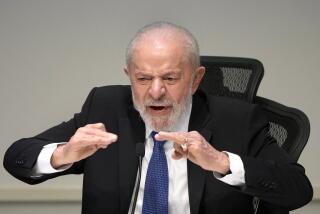Economy is key in Brazil’s presidential runoff, voters say
When Karina Gonzaga thinks about whom she’ll vote for in Sunday’s presidential runoff election, she doesn’t care that Brazil’s long economic boom has suffered a downturn or that President Dilma Rousseff’s center-left Workers’ Party has already been in power for 12 years.
All she thinks about is how things were before Rousseff’s party took over.
“I’d never think of voting [for] anyone but Dilma. And it’s not just because I received help when I was unemployed, or that one of her programs allowed me to do a professional course,” says Gonzaga, 35, a cook in this small town in Brazil’s relatively poor northeastern region that forms the backbone of the incumbent’s base. “Things here have been transformed. There’s work. It’s just better.”
Rousseff, seeking a second four-year term, holds a small lead in polls as voters prepare to cast their ballots in a topsy-turvy race that has seen one presidential candidate die, his replacement rise and fall spectacularly in the polls, and the debate finally return to the classic Brazilian themes of corruption and social justice.
Rousseff supporters are pitted against the likes of Rio de Janeiro attorney Paula Batista, a member of Brazil’s upper middle class, which is much more likely to vote for the more market-friendly candidate Aecio Neves of the Social Democracy Party.
“I voted for Dilma before but after I heard about the recent corruption scandal, I decided it’s time for the Workers’ Party to go,” Batista said. “The economy is a mess and the country needs a new, more prepared team. We need to deliver a shock to get things going again.”
Rousseff and Neves, who are both closer to the center than most politicians in Brazil’s rambunctious multiparty democracy, used final debates to trade accusations over who knew and received what in a bribery scandal involving Petrobras, Brazil’s state-owned oil company. Leaked testimony in an investigation alleges that the Workers’ Party and its allies received large kickbacks, but also names the former president of Neves’ party as a recipient in the scheme.
Rousseff rose in the polls recently as her party’s battle-hardened electoral machine unleashed an impressive wave of rallies across the country, hammering home the message that social programs were safer in her hands. Neves is heavily favored by international investors, who have sent Brazil’s stock markets and currency up and down in line with his perceived chances. He could still pull off an upset at the polls.
Neves, whose grandfather was elected president but died before taking office, says he will keep social programs in place, but restore growth by pursuing a less interventionist economic program. Both candidates say they can deliver improvements to Brazil’s public health, education and transportation systems, which most Brazilians say are badly needed.
The state of Pernambuco, where Gonzaga lives, has played a crucial role in the election. After Socialist Party candidate Eduardo Campos, a native of the state, was killed in an August plane crash, his environmentalist running mate Marina Silva took over for him and won in Pernambuco and another state in the first round of voting. At one point, she led in the polls before falling behind Neves nationwide when the ballots were cast.
It is also the home of former President Luiz Inacio Lula da Silva of the Workers’ Party, whom Rousseff followed in office. Lula oversaw significant economic growth and social advances, fueled by a global commodities boom and expanded programs for the poor, such as the widely celebrated Bolsa Familia, which supplied those like Gonzaga with financial aid when they were out of work. Under Rousseff, growth has faltered and inflation hovers around the upward legal limit of 6.5% per year. At the same time, unemployment has remained low while wages have increased.
“This is not an ideological race,” says Peter Hakim, president emeritus at the Inter-American Dialogue, a Washington think tank that focuses on relations with Latin America. “One end of the income spectrum is concerned about losing what they have and doesn’t fully trust anyone but the Workers’ Party, and the upper end is nervous that the country is entering a long period of stagnation.”
Bevins is a special correspondent.
More to Read
Sign up for Essential California
The most important California stories and recommendations in your inbox every morning.
You may occasionally receive promotional content from the Los Angeles Times.










